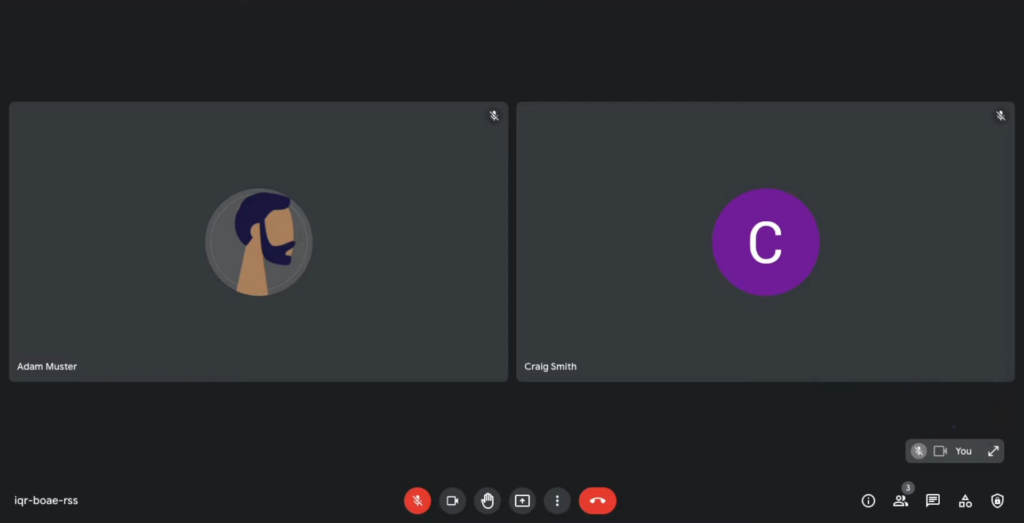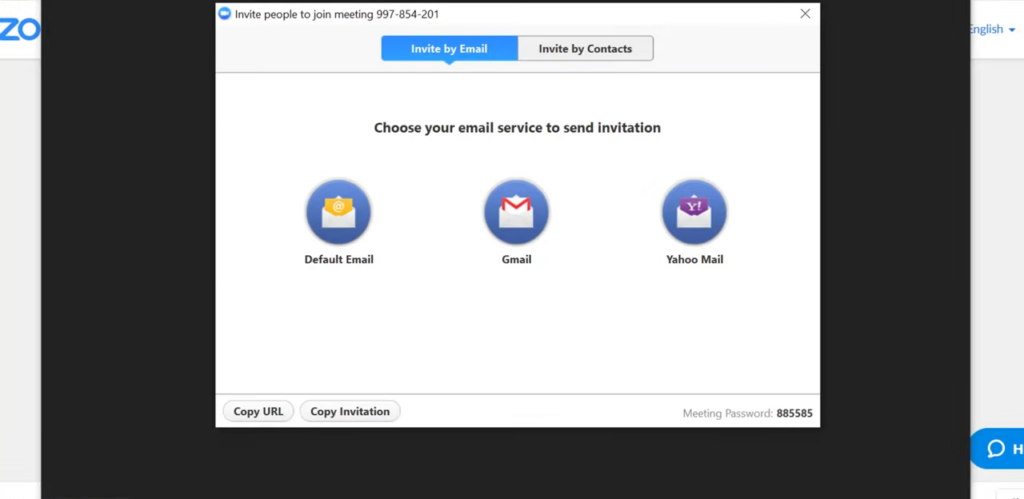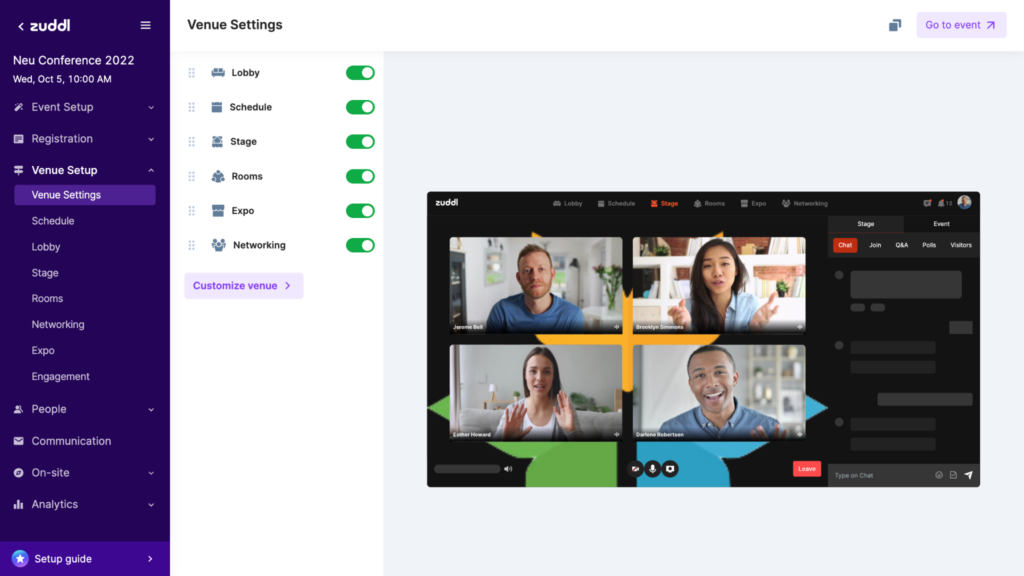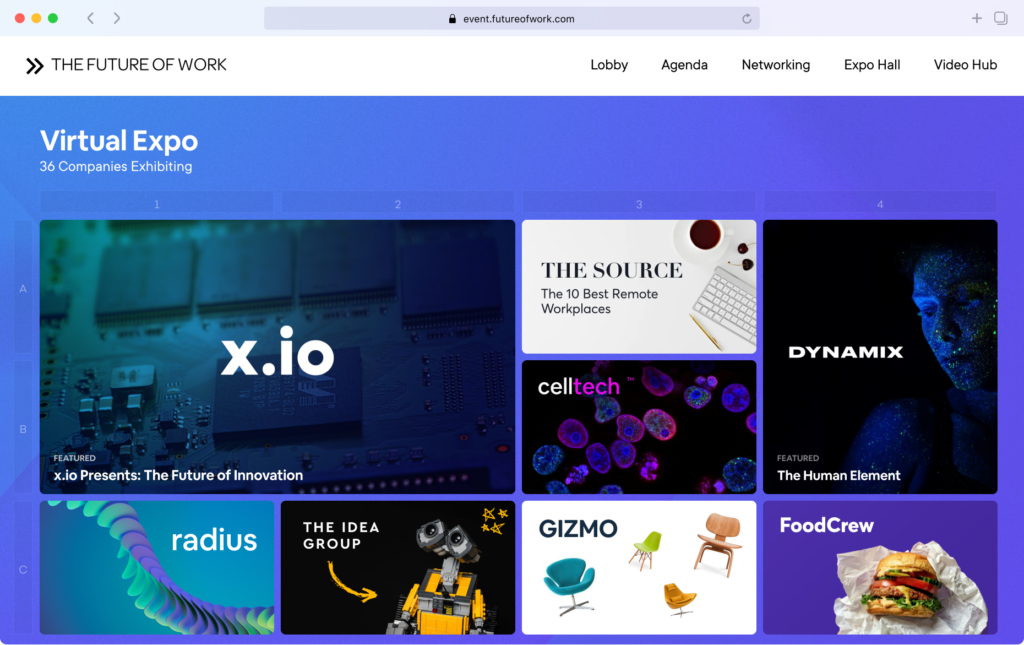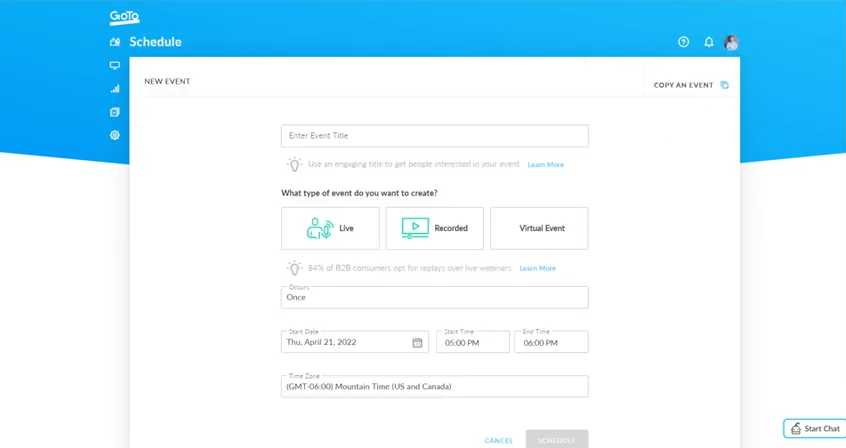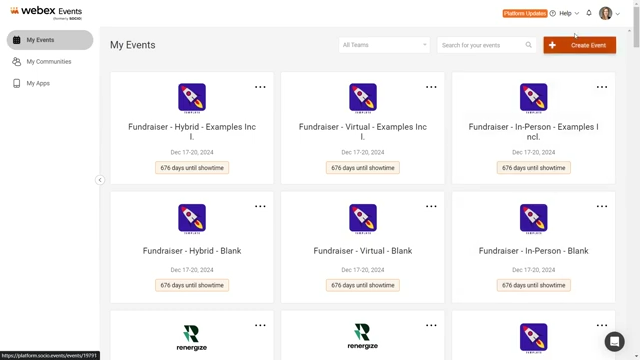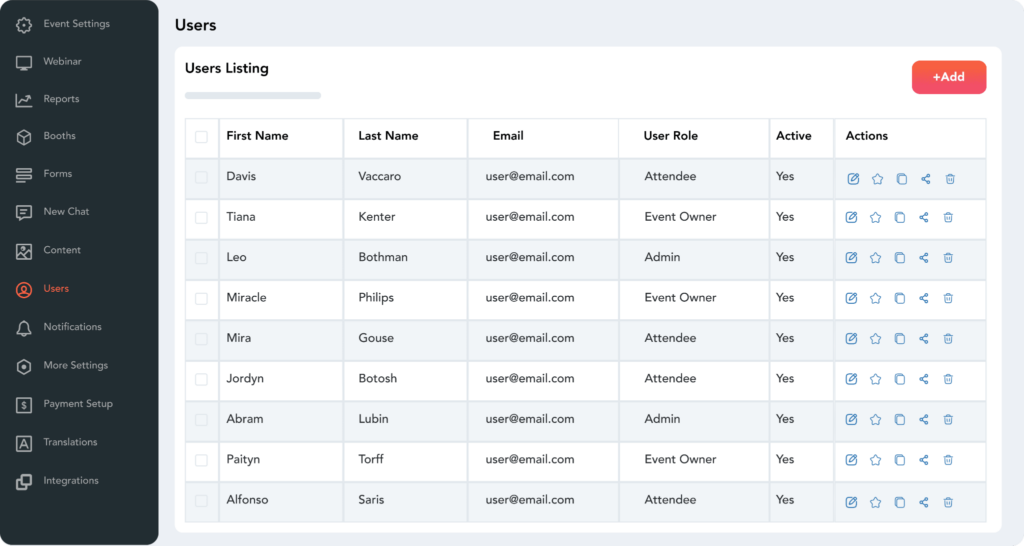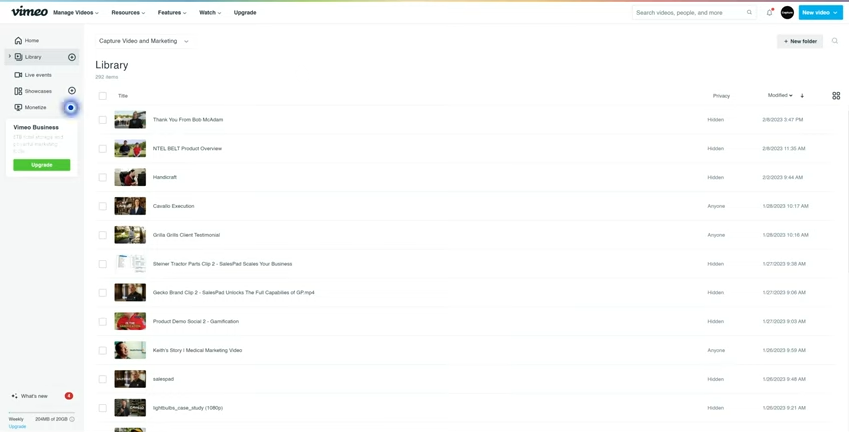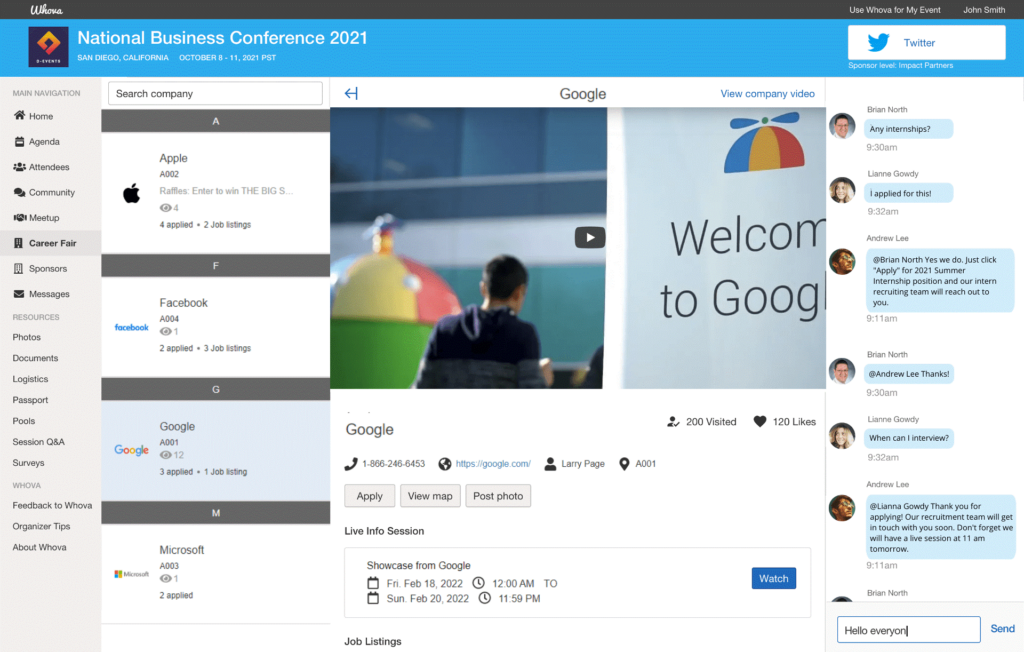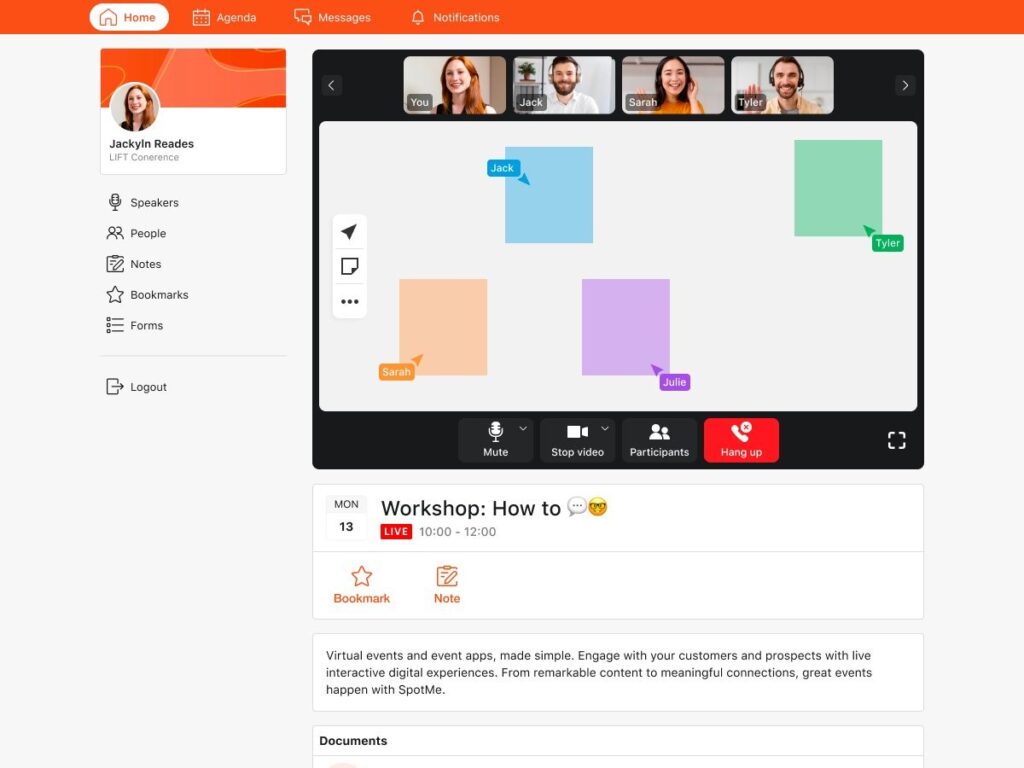Best Virtual Event Platform Shortlist
Here are the platforms I chose for this article after determining their suitability for holding digital events.
- Google Meet - Best for virtual video meetings
- Zoom - Best for conferences
- Zuddl - Best for customizable virtual events
- BigMarker - Best for hosting multiple event types
- GoToWebinar - Best for webinars
- Expo Pass - Best for virtual event management
- Webex Events - Best end-to-end virtual event platform
- vFairs - Best for virtual networking events
- Goldcast - Best for creating money-making virtual events
- Vimeo - Best for live streaming events
- Whova - Best for interactive virtual events
- SpotMe - Best for immersive digital experiences
Virtual event platforms allow businesses to interact, share thoughts, and get their thoughts across to target audiences worldwide. Be it an online trade show, academic conference, or virtual summit, organizing a virtual event can be challenging. You might already use various systems to organize various event functions, such as venues, attendees, ticketing, and payments. For the purpose of this article, I listed the best virtual event platforms to help simplify these processes.
What Are Virtual Event Platforms?
Virtual event platforms are event management systems that help you host target audiences for virtual gatherings, such as webinars, Q&A sessions, workshops, and other online events. Virtual event platforms help facilitate the planning and execution of your online events. While online events can lack face-to-face connection, the top virtual event tools help you recreate that environment and allow your audience to join from wherever they are around the globe.
Overviews Of The 12 Best Virtual Event Platforms
Here’s my evaluation of each virtual event platform I chose to add to this top list and why I believe it deserves consideration.
1. Google Meet - Best for virtual video meetings
Google Meet is a platform service that lets users start and participate in one-on-one or group voice or video chats. Up to 30 attendees can participate in high-definition video meetings through the platform.
Why I picked Google Meet: I wanted to start off this list with an evaluation of Google Meet (formerly Google Hangouts) because it allows you to create efficient video meetings. You can use Google Meet to create custom and secure online video events quickly. All you need to do to start a new virtual meeting is choose a hyperlink or enter a meeting code.
Google Meet Standout Features and Integrations
Features include background noise cancellation that automatically eliminates distracting background sounds when holding an online meeting. Google Meet also allows users to record video meetings which are automatically saved to Google Drive.
Integrations include connections with popular business systems that organizations use to maintain effective operations. These integrations include connections with vital business systems such as Desktop.com, Fireflies.ai, Flowtrace, Freshteam, Gong.io, Hirestream, Pipedrive, RevenueHero, Synth, Xembly, and other software options.
Pricing: From $6/user/month.
Free Trial: Free plan available.
Pros
- Easy to use
- Starts meetings almost instantly
- Users can add captions and subtitles
Cons
- Chat section has a word limit
- Video/audio cuts out sporadically
2. Zoom - Best for conferences
Zoom is a popular video conference for professional organizations and digital entrepreneurs. The platform provides many useful tools to help users create important virtual conference events and share what they want to talk about without meeting in real life.
Why I picked Zoom: Virtual conferences are a popular online event that you might hold to hold discussions with an audience, so I added Zoom because the tool gives you some flexibility when creating online conferences. When creating a new conference, you can host 1000+ participants in one event. Zoom provides a stable platform with various engagement tools when hosting free, paid, live, and on-demand conferences.
Zoom Standout Features and Integrations
Features include screen-sharing capabilities that allow you to collaborate with colleagues and partners. Zoom also allows you to record meetings that you can share with people who couldn't register for your event.
Integrations include connections with third-party systems and tools that work well together with the Zoom platform. These include software such as Calendly, Domo, Google Calendar, HubSpot, Keap, Peoplelogic.ai, Slack, Salesforce, Smartsheet, Zendesk, and other software options.
Pricing: From $12.49/month, billed annually.
Free Trial: Free plan available.
Pros
- Simple to use
- Ability to record a meeting
- Share screen and marker used during meetings
Cons
- Limit of 40-min video for non-premium users
- Bandwidth intensive on browsers
3. Zuddl - Best for customizable virtual events
Zuddl helps organizations quickly create custom virtual events. The platform allows them to replicate every aspect of in-person events, from networking events to expo displays.
Why I picked Zuddl: Many digital media organizations depend on custom solutions to ensure their online events fit their branding and company message, so I added Zuddl to this list because it can help you tailor your virtual events. The platform provides you with drag-and-drop tools to help you create high-quality events for your audience. Zuddl also offers ready-to-use templates and no-code builders that will help you customize your events even faster.
Zuddl Standout Features and Integrations
Features include an event landing page builder to allows you to quickly create stunning landing pages to help you promote your next events. Zuddl also offers multiple event widgets that allow you to develop highly interactive events that your attendees will enjoy.
Integrations include native connections to help you deliver high-quality experiences without having to switch between too many systems. These include applications such as Eloqua, HubSpot, Interprefy, Mailchimp, Marketo, Miro, Pardot, Salesforce, Slack, Taggbox, and other software options.
Pricing: From $80/month.
Free Trial: 30-day free trial.
Pros
- Customizable
- Flexible and easy to use
- Support a large group of participants
Cons
- No virtual background feature
- Sometimes lags
4. BigMarker - Best for hosting multiple event types
BigMarker allows digital professionals to host many types of virtual events, such as online classes, presentations, webinars, and webcasts from your computer to the rest of the world.
Why I picked BigMarker: Many of the virtual event platform options available will focus on one type of event, so I wanted to add BigMarker to this article because it allows you to host multiple types of online events from one platform. BigMarker allows you to choose from 15 virtual events to host, making it easier for you to choose the event you want to host. It also offers you the ability to tailor most aspects of your event to meet your preferences.
BigMarker Standout Features and Integrations
Features include simple registration tools from within the platform, allowing you to choose the pass type you want to provide attendees with and which event uses specific passes to access. BigMarker also enables users to customize check-in journeys that empower attendees to choose agendas to attend and browse connection recommendations based on interests and profiles.
Integrations include connections with leading tools, such as marketing, email, and CRM applications, to increase efficiency and productivity. You can integrate BigMarker with various systems such as ActiveCampaign, Calendly, ConstantContact, HubSpot, Instapage, Keap, Mailchimp, Salesforce, Unbounce, and other software options.
Pricing: From $89/month.
Free Trial: Free demo available.
Pros
- Robust marketing capabilities
- Fast and competent customer support
- Flexibility and easy to use
Cons
- Steep learning curve
- Recording process takes time
5. GoToWebinar - Best for webinars
GoToWebinar is a popular webinar tool digital media companies can use to generate qualified leads. They can also hold webinars with customers, coworkers, or stockholders.
Why I picked GoToWebinar: Whether you’re doing a product demo, holding a conference, or hosting an online meeting, GoToWebinar is the go-to platform for webinars. Business owners can use this platform to reach their audience, generate leads, provide training, and hold video conferences. After your webinar is over, GoToWebinar will provide you with detailed analytics to help you understand your audience better and optimize future webinars.
GoToWebinar Standout Features and Integrations
Features include the ability to pre-record webinars that feel like live events to your audience, and you can share them over and over again. There’s also a webcast mode that allows you to host a live stream with up to 3,000 attendees without them having to download any programs, allowing them to view your webinar from their web browser.
Integrations include connections with the tools that many organizations are currently using, allowing them to quickly collaborate and grow their business. These integrations include systems such as AWeber, Calendly, Clio, Eloqua, HubSpot, Marketo, Salesforce, Unbounce, Zendesk, Zoho CRM, and other software options.
Pricing: From $49/organizer/month, billed annually.
Free Trial: 7-day free trial.
Pros
- Good quality video and audio
- User-friendly
- Very easy to use
Cons
- Can glitch in different regions
- Setting up webinars has a learning curve
6. Expo Pass - Best for virtual event management
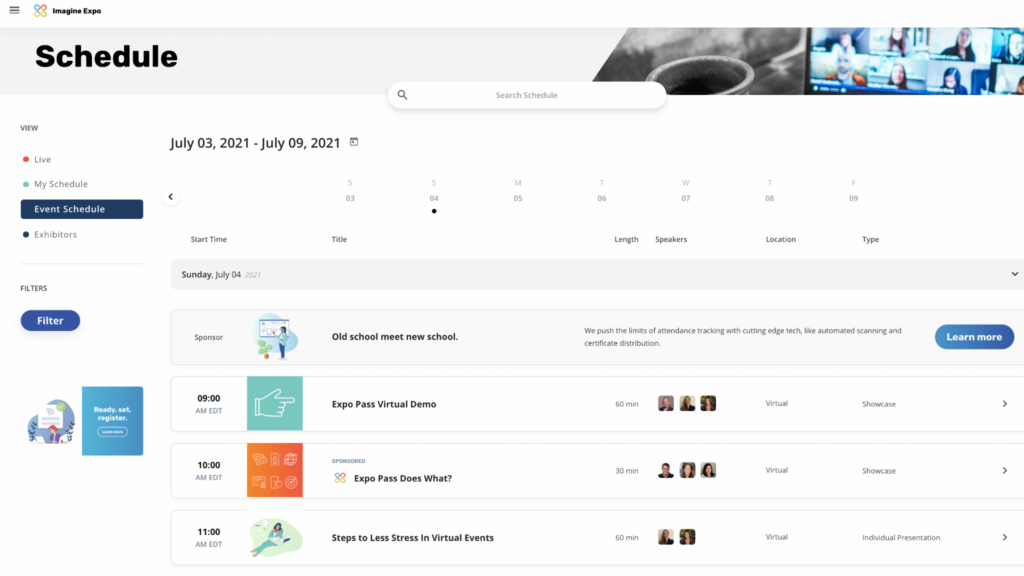
Expo Pass helps organizations plan, track, and host any type of virtual event with future-thinking technologies.
Why I picked Expo Pass: If you’re already using one of the virtual event platforms in this list, you can use Expo Pass to make the process of holding an online event easier. With Expo Pass, you can efficiently plan your virtual events by selecting, mixing, or combining the platform’s various features. You can use the platform to manage registration, check-ins, event apps, lead retrieval, and other functions for your virtual events.
Expo Pass Standout Features and Integrations
Features include the ability to make a mobile app for your events to enhance your attendees’ experience that’s immediately available when registering. Expo Pass also provides high-level technology to help you track attendance and get important data to help you optimize future events.
Integrations include a limited number of applications to help you host various types of virtual events, such as Zoom, GoTo Meeting, Webex, Restream, GoTo Webinar, and Vimeo Livestream. If you have a paid Zapier account, you can connect Expo Pass to your current virtual event platforms and other operational tools.
Pricing: Pricing upon request.
Free Trial: Free demo available.
Pros
- End-to-end event planning tools
- Simple branding capabilities
- Easy to use
Cons
- Doesn’t have many integrations
- Not many customization capabilities
7. Webex Events - Best end-to-end virtual event platform
WebEx Events is an end-to-end virtual event platform that helps digital businesses host customizable events. It’s a purely virtual event platform that enables organizations to host various types of events, such as meetings, conventions, and webinars.
Why I picked WebEx Events: The platform is an all-in-one virtual event platform that helps you power continuous engagement to enhance the results of your online events. WebEx Events is a robust virtual event platform that helps you manage various online events. It provides a significant number of features to help increase the performance of your events and ensure straightforward event operations, such as interactive attendee networking and custom virtual venues.
WebEx Events Standout Features and Integrations
Features include sponsor visibility capabilities, such as dedicated video rooms and sponsor profiles, to help you make compelling cases to increase the likelihood of securing event sponsorships. WebEx Events also allows you to track real-time insights, such as attendees, ticket types, and other vital analytics, in a simple registration metrics dashboard.
Integrations include the ability to connect WebEx Events with your systems to enhance the experience of your virtual events, such as Boomset, Cvent, Interprefy, Miro, OBS Studio, RegFox, Slido, Snapbar, SyncWords, Vidcast, and other software options. You can also use a paid Zapier account to create custom integrations and automated workflows for your virtual events.
Pricing: From $84/month.
Free Trial: Free demo + free plan available for up to 50 attendees.
Pros
- Easy to use
- Fast chat support
- Regular updates
Cons
- Could use more customization capabilities
- Extra costs for API access
8. vFairs - Best for virtual networking events
vFairs emphasizes virtual environments to allow attendees to explore virtual venues similar to the real world, making it easier for everyone to find and connect with the right people.
Why I picked vFairs: I decided to add vFairs to this list after my evaluation of the platform because its ability to facilitate efficient virtual networking events makes it a relevant option to consider. vFairs allows you to create 3D lobby areas with directories that empower your attendees to navigate to specific networking rooms. Your attendees can also find new contacts and book meetings with booth representatives before your virtual event starts.
vFairs Standout Features and Integrations
Features include customized venues that allow you to replicate in-person events and strengthen your branding. vFairs users can create virtual exhibit halls that provide interactive virtual experiences that are easily navigable.
Integrations include connections with popular applications used by many digital media organizations that will help create enhanced event experiences for attendees, sponsors, and teams, such as Eloqua, HubSpot, Interprefy, Marketo, ReStream, Salesforce, Slido, Stripe, WebEx, Zoom, and other software options. Those with a paid Zapier account can create custom integrations between your virtual event and any system you’re currently using.
Pricing: Pricing upon request.
Free Trial: Free demo available.
Pros
- Fast response on technical support
- Easy to use
- Customizable
Cons
- Needs more landing page options
- Customizations can slow the platform down
9. Goldcast - Best for creating money-making virtual events
Show images or buffer videos until speakers go on stage.
Goldcast is a virtual event platform that can help organizations generate revenue from their online events.
Why I picked Goldcast: The platform can help your teams speed up the sales funnel and ultimately boost sales by ensuring that marketing and sales departments work well together. Not only does Goldcast provide excellent attendee experiences, but it also collects granular insight to help create custom campaigns. Goldcast gives marketing professionals the intelligence and insights they need to prioritize leads from events and provide your sales team with real-time that enables them to follow up with a variety of target accounts.
Goldcast Standout Features and Integrations
Features include customizable registration forms that allow you to tailor them to fit your brand better without coding expertise. Goldcast also allows you to operate single or multiple-track events with concurrent sessions with either live or pre-recorded videos.
Integrations include native connections built by Goldcast to enhance event experiences and share data between systems. These include connections with applications such as Cvent, Drift, Drimify, Engamio, HubSpot, Marketo, Salesforce, Slack, Snapbar, Splash, and other software options.
Pricing: Pricing upon request.
Free Trial: Free demo available.
Pros
- Easy to use
- Backstage area for microphone testing
- Attendee engagement customization with speaker
Cons
- Steep learning curve at first
- No way to template events
10. Vimeo - Best for live streaming events
Vimeo is a video streaming platform that digital media organizations can use to host virtual events through live streams.
Why I picked Vimeo: The platform is a video hosting tool that you can use to hold simple live virtual events. Vimeo is an all-in-one platform for video hosting and sharing that allows you to live stream your online events and add the video feed to your website, blog, or anywhere else on the internet. It’s able to live stream your events in full high-definition with adaptive streaming, allowing your attendees to get the best experience across any device.
Vimeo Standout Features and Integrations
Features include interactive video experiences that allow you to share immersive brand stories through interactive video touchpoints. Vimeo also provides a screen and webcam recorder that allows you to quickly share videos.
Integrations include over 200 connections with top business systems such as Dropbox, GetResponse, Google Analytics, Miro, Orange Logic, Rambox, Sitejet, Slack, Zoom, Zuddl, and other software options. Vimeo also provides an API that allows you to create custom integrations.
Pricing: From $11/month.
Free Trial: 7-day free trial + free plan available.
Pros
- Easy to use
- High-quality video streaming
- Customizable video player
Cons
- Needs more detailed performance data
- Customer support needs work
11. Whova - Best for interactive virtual events
Whova is an all-in-one virtual event platform that helps digital media companies create interactive online events.
Why I picked Whova: I wanted to add Whova to this article because of its ability to help you create interactive virtual events. Whova provides all the tools you need to make your virtual events better for everyone involved and increase engagement. For example, the platform provides ice-breaker and leaderboard gaming capabilities that will add an extra twist to your events.
Whova Standout Features and Integrations
Features include security capabilities that will prevent Zoom bombing by making sessions viewable only to registered attendees. Whova also allows you to offer exclusive sessions to attendees who have access via higher-tier tickets.
Integrations include limited native integrations with systems such as aarwinMEP, Eventbrite, RegFox, and SurveyMonkey. If you have a paid account with Zapier, you can create custom integrations with your current toolset.
Pricing: Pricing upon request.
Free Trial: Free demo available.
Pros
- In-depth event details
- Easily shares information with attendees
- Allows attendees to download presentations
Cons
- Interface can be overwhelming for new users
- Some messages between attendees can disappear
12. SpotMe - Best for immersive digital experiences
SpotMe can help organizations create immersive digital experiences that will help accelerate engagement and customer relationships at scale.
Why I picked SpotMe: Those with experience planning, operating, and optimizing virtual events can understand why it’s important to keep audiences engaged with the content. So to help, I added SpotMe to this list because of how it can help your organization provide immersive digital experiences. From breakout sessions to gamification, SpotMe provides built-in tools to ensure that you focus on enhancing your attendees’ experiences.
SpotMe Standout Features and Integrations
Features include attendance tracking capabilities to help you monitor audience attendance at your event or specific sessions and collect this valuable data. SpotMe also allows you to create personalized event journeys for your attendees and help them find what they need.
Integrations include connections with some of the top operational systems to help automate workflows and accurately pass along data. These integrations include systems such as Aventri, Eloquoa, eventcore, Hubb, HubSpot, Marketo, RainFocus, Salesforce, Veeva CRM, Zoom Video Webinars, and other software options.
Pricing: Pricing upon request.
Free Trial: Free demo available.
Pros
- Helpful analytics
- Excellent customer support
- User-friendly
Cons
- Doesn’t accept payments
- Streaming quality can vary
Other Options
Here are more virtual event platforms that didn’t make the top list but are worth considering.
- Hopin - Best for international networking and events
- HeySummit - Best for helping creators generate ticket revenue
- Accelevents - Best for simplifying event planning processes
- Zoho Meeting - Best for presenting product demos
- Remo - Best for building meaningful audience relationships
Selection Criteria For Virtual Event Platforms
Here’s a short summary of the main selection and evaluation criteria I used to develop my list of the best virtual event platforms for this article:
Core Functionality
There are many various types of virtual event platforms you can use in your business, but they all have the same functionality that qualifies them to be added to this list. The basic core functionality that each virtual event platform must meet to be considered a viable option.
- Ability to provide various ways to engage with audiences, such as polls, waiting rooms, live chat, Q&As, and more.
- Ability to place attendees in a “room” where speakers hold presentations for attendees with their webcams and microphones turned off
Key Features
When choosing the virtual event platforms for this list, I explored the features they offer and how they help you accomplish your event goals. Here are some of the top features I considered when writing this article.
- Audio and Video: Many attendees don’t have patience for poor video and audio quality and expect to clearly see what’s in the frame and hear everything as if they’re in the same room as you.
- Chat and Polling: Virtual event platforms can allow quests to participate in real-time from wherever they are, allowing you to converse with attendees and enabling them to ask questions and let you know when something goes wrong.
- Accessibility and Security: These tools ensure invitees can access events anywhere, and only your invitees; accessibility also optimizes the view of your presentation if they’re using a phone, computer, tablet, or other devices.
- Networking Tools: Networking is the lifeblood of any virtual event, allowing you to empower attendees to make meaningful connections that benefit them well into the future.
- Event Branding: Well-branded events can enhance your attendees' experiences and leave them impressed; you can do this with capabilities such as customizable color schemes, branded registration and landing pages, and branded emails.
- Analytics and Reporting: Analytics dashboards let you track vital metrics such as attendees, registrations, and engagement to help you understand what’s working and what isn’t so you can optimize future virtual events.
Usability
I ensured to add virtual event platforms that allow your attendees to quickly find their way through the registration process, explore your event, and connect with you and other attendees. You should also be able to easily set up online meeting rooms and customize them to match your branding. These platforms also make it easy to track registration and engagement insights.
Software Integrations
When writing this list, I also focused on adding tools that have many integration possibilities. The virtual event platform you use should connect with the systems you’re already using in your business, such as customer relationship management, email marketing, and payment processing applications. These connections help you optimize the event management process and enhance your attendees’ experiences.
Customizability
Creating immersive experiences for attendees is an excellent way to set your virtual event apart from the competition. I looked for virtual event platforms that provide extensive customization capabilities. Many of the tools I added to this list allow you to customize the way your virtual space looks and feels via images, color, audio, and video content.
People Also Ask
When searching for new virtual event platforms, you might have some questions that need answering to help you narrow down your choices; luckily, other people have these questions as well. Here are some common questions people ask during their search for new virtual event tools
What are the benefits of virtual event platforms?
Here are some of the benefits you can experience when using virtual event platforms.
- Cost Savings: There are many costs associated with hosting in-person events, especially the price of securing a place to host it. Planning virtual events eliminates these costs, allowing you to invest more money in good speakers, paying staff, and identifying the best platforms to run an event.
- Reach a Wider Audience: In-person events can limit your audience’s availability if they don’t live in the same area. Virtual events allow people worldwide to attend from anywhere with an internet connection and a device to watch it on, opening the opportunity to reach loyal audiences and get new viewership, increasing your event’s impact.
- Increased Engagement: Through customization capabilities and polling features, you cause a virtual event platform to develop a sense of community with your attendees. Then y can provide more attendee engagement opportunities with one another and guest speakers.
What are the different types of virtual event platforms?
There aren’t any hard and firm rules when it comes to what’s classed as a virtual event; it’s anything you can make of it, as long as you can preserve the virtual element. Some of the popular types of virtual events include:
- Virtual Conferencing: A conference gathers individuals with the same interests, goals, and similar industries in one room to promote information exchange through discussions and visual presentations. Online conferences are the most versatile virtual events because they’re scalable and relevant to many business objectives.
- Broadcast: As the name suggests, the broadcast experience is similar to watching TV or a live stream where attendees and viewers are possessive contributors with limited roles to answering questions, voting, and reacting. The main focus of a virtual broadcast is reserved for guests and speakers.
- Virtual Workshops: The main goal of a virtual workshop is skill development, and it welcomes a limited number of attendees. Workshop participants gather in a virtual room and interact with the speaker as you would in a classroom setting; additional one-on-one segments, if any, are accommodated in separate breakout rooms.
- Virtual Networking: A networking event can be an add-on to other types of virtual events or be an event in itself. The goal of a virtual networking event is to gather attendees together and develop meaningful conversations and connections.
How much do virtual event platforms cost?
The final cost of virtual event platforms depends on your event’s scale, complexity, and attendee count. The different event types can also impact the final cost because some require simple live streams, whereas others need more advanced functionality, such as live polls, networking rooms, and simultaneous sessions. Some choices provide free access to their platform, but as you can see from this article, you can be paying anywhere between $6/user/month to $89/month.
Other Community Engagement Platforms
A significant result of virtual event platforms is their ability to create a community that surrounds your business. To help enhance your search for tools to build your community, you can check out the following tool lists.
- Online Community Software
- Community Engagement Software
- Community Builder Software
- Community Forum Software
- Community Management Software
The Takeaway
With the right virtual event platform, you can create the best kind of online event you need to promote your business and garner valuable relationships with your target audience. Whether you’re hosting team meetings, hosting a virtual hiring event, organizing a business partner webinar, or promoting an online industry conference with key speakers, the tools I evaluated for this article will enable you to deliver impactful, engaging experiences that enhance business results. As with any tools you implement in your business, remember to consider what your needs are, work within your budget, and identify which features matter most and then try demos and free trials before making a final decision.
If this list was helpful and you need more tooltips and digital media advice from top professionals, sign up for the Indie Media Club newsletter.

